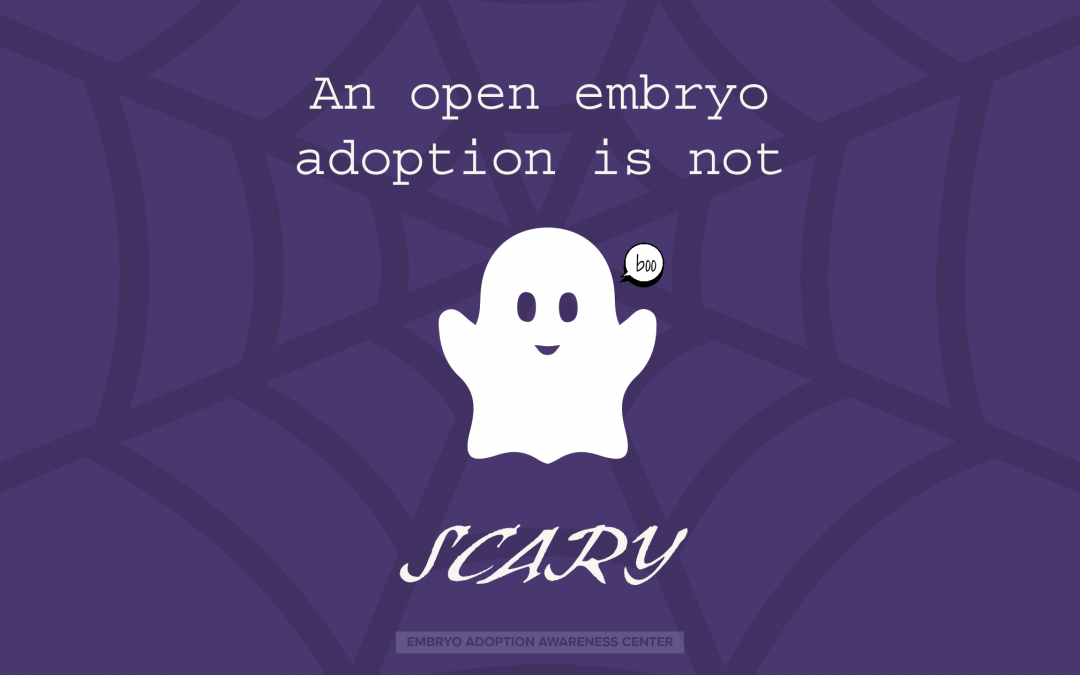October is a month of scary stories, trick-or-treating little ones, and terrifying costumes. What is better time to address one of the “spookier” aspects of adoption? We are talking about open adoption.
Even though open adoption is extremely common in the United States today (95% are open!), the idea still has many new perspective adoptive parents running for the hills. However, studies have shown this adoption model is much more beneficial for all parties involved. This is especially true for families considering embryo adoption.
Many of the initial fears adoptive parents may have when considering embryo adoption are built on myths and falsehoods. We listed five major fears associated with an open embryo adoption and how you can face them!
1. An open embryo adoption will result in co-parenting.
Hopeful adoptive parents are often worried that open communication with embryo donors will lead to co-parenting. The idea that they have raised their own children (biological siblings to your child), so they know best.
This is not the case. An open embryo adoption does not lead to co-parenting. Communication is not a gateway to shared responsibility, nor is it a slippery slope to confusing the roles the adults play in your child’s life. As your child’s true parents, you can help them understand the importance of their placing family without blurring the lines of parental responsibility.
2. My child will reject me if they know about their conception story.
As your child grows, they will eventually ask questions about personal identity that are more nuanced than they would be for a child born into a biological family or a child adopted through traditional means. This is not bad thing, simply different. It is natural and healthy for a child to express interest and affection for their placing family, especially their biological siblings.
One common misstep for embryo adoptive parents is to jump to the worst-case scenario when this happens and equate their child’s interest with rejection. Open adoption provides clear answers that can help a child form a positive self-identity. Keep in mind that it is possible for a child to feel genuine love for both you and placing family. Moreover, no matter what, they are your child.
3. The placing family will want to take away my child after they are born.
Another common fear about an open embryo adoption is that it is, in some way, a caveat to complete placement. Here is the truth: when your child is born, you are recognized as the child’s legal parents. You and your partners’ names are automatically listed on your child’s birth certificate. No waiting periods, no court dates for finalization.
Aside from this legal security, this fear can also be addressed with a better understanding of a donor family’s intentions in donating their remaining embryos. Many families decide to donate because they simply do not have the means to add another child to their home. Whether it is financially motivated, or their family is already complete, or some other reason.
They also have their own children to parent—their own children’s birthday parties to plan, their soccer games to coach, their grueling piano recitals to sit though. They are not looking to take on any more responsibility! They donated their embryos because they know you will provide your child with the love and a chance at life that they (for whatever reason) were not able to give.
4. My child will be confused by open adoption and their conception story.
Something that is uncommon does not automatically mean it is confusing. Just because most children are not born into a family through embryo adoption and have communication with their donor family, does not mean that children cannot understand the relationship. In fact, what often happens is that the adoptive family is projecting their own confusion onto children.
When explained simply and at an age-appropriate level, your child will be able to understand that you are their true parents, while also understanding they have another family who loves them very much. So much so, they wanted to give them a chance at life before they were even born! There may be difficult moments and times when words seem to fail. However, your child will be able to comprehend their situation if they know they are loved.
5. We will be locked into a communication agreement that we are not comfortable with.
“What if we want something different than the placing family?” “What if our situation changes and we cannot communicate as much?” “How can we manage mediation?”
Successful open adoptions typically have clear expectations and consistent boundaries. Embryo adoption agencies, like the Snowflakes Embryo Adoption Program, will match families based on preferences for communication and create an agreement that all parties agree to.
It takes both sides to maintain a healthy arrangement. However, flexibility is not a bad thing! If you think of your open adoption is leading towards a genuine relationship, it is natural that things will occasionally change and adjust. Try to think of this as an opportunity grow rather than a burden to carry.
The bottom line: An open embryo adoption is not a threat to custody. Rather, it is an opportunity to form a wonderful relationship.
Considering an open embryo adoption can start out as an emotional subject and it can be confusing, but it can also be the start of a beautiful, life changing relationship! You can view our webinar Addressing Fears Associated with Open Adoption for further information. We encourage you to research, ask questions, and consider what benefits an open embryo adoption would look like for your family and future child.
To learn more about embryo adoption and donation, visit EmbyroAdoption.org.


Recent Comments